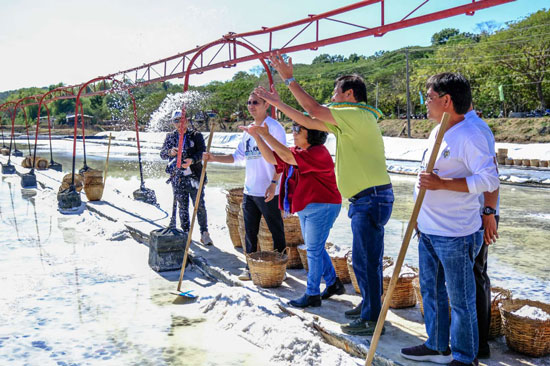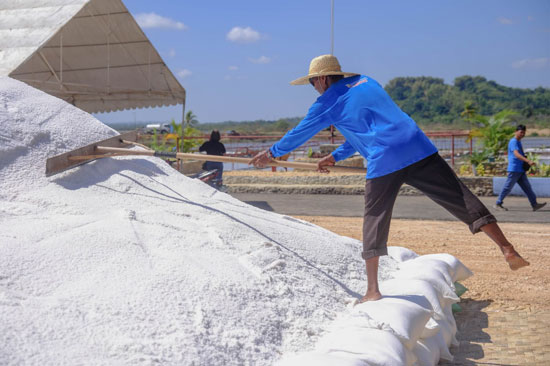 The Department of Environment and Natural Resources (DENR) has been mandated to map and identify public lands, including portions of municipals waters, as suitable salt production areas in a bid to revitalize the country’s salt industry after Republic Act (RA) 11985 or the Philippine Salt Industry Development Act took effect on April 1, 2024.
The Department of Environment and Natural Resources (DENR) has been mandated to map and identify public lands, including portions of municipals waters, as suitable salt production areas in a bid to revitalize the country’s salt industry after Republic Act (RA) 11985 or the Philippine Salt Industry Development Act took effect on April 1, 2024.
On March 11, President Ferdinand Marcos, Jr. approved and signed RA No. 11985 “An Act Strengthening and Revitalizing the Salt Industry in the Philippines, Appropriating Funds Therefor.”
Pursuant to Section 9 of the Act, the DENR, through its appropriate bureaus and its attached agencies, the National Mapping and Resource Information Authority (NAMRIA) and the Bureau of Fisheries and Aquatic Resources (BFAR) are mandated to map out, identify, and designate public lands, including portions of municipal waters, as salt production areas.
Priority shall be given to public lands situated in the provinces identified as suitable for salt production and declared as priority areas for salt production namely Ilocos Norte, Ilocos Sur, La Union, Pangasinan, Zambales, Bataan, Occidental Mindoro, Oriental Mindoro, Palawan, Marinduque, Quezon Province, Misamis Oriental and Antique, within 60 days from the effectivity of the Act.
Public lands located in other regions shall also be subsequently mapped out, identified and designated as potential salt production areas within six months from effectivity of the Act.
The DENR is also mandated to inform the public of the result of the mandatory mapping, identification, and designation of public lands for salt production to inform interested salt industry investors. It shall also provide the Congressional Oversight Committee on Agriculture and Fisheries a report on the completion of the mapping, identification and designation of public lands for salt production.
 A Salt Industry Development Council or Salt Council shall be created “to ensure the unified and integrated implementation of the Salt Roadmap and accelerate the modernization and industrialization of the Philippine salt industry” where the DENR Secretary shall be a member or her designated permanent representative.
A Salt Industry Development Council or Salt Council shall be created “to ensure the unified and integrated implementation of the Salt Roadmap and accelerate the modernization and industrialization of the Philippine salt industry” where the DENR Secretary shall be a member or her designated permanent representative.
Pursuant to Section 10, the DENR is mandated to transfer the public lands mapped out, identified, and designated as suitable for salt production under its administrative jurisdiction to the BFAR within 90 days from the effectivity of the Act.
Accordingly, the DENR shall repeal or amend DENR Administrative Order No. 98-67 series of 1998 or the Guidelines for the Identification, Declaration and Award of Areas Suitable for Salt Production.
In February, DENR Secretary Maria Antonia Yulo Loyzaga visited Pangasinan and recognized the project of Pangasinan Gov. Ramon V. Guico III and the Sangguniang Panlalawigan headed by Vice Gov. Mark Ronald DG Lambino to develop a 473-hectare salt farm in Barangay Zaragoza.
“This is the kind of integrated approach that is necessary to secure food, health, nutrition, and water essential to energy security,” Loyzaga said.
“Itong project ay bilang tugon sa panawagan ni Presidente Bongbong Marcos na muling buhayin ang salt industry dito sa bansa.So on behalf of DENR, sana nakatulong po kami sa muling pagbuhay sa asin industry dito. At kung mayroon pa kaming maitulong, please huwag kayong mag-hesitate na lumapit sa amin,” Loyzaga added.
In 2022, the DENR and the province of Pangasinan signed a Memorandum of Agreement for the management of the salt farm where the provincial government will be the “interim” manager of the foreshore area for salt production and other related activities including bangus production.
The previous lease contract on the salt farm has expired and was not renewed by the lessee prompting the DENR to close the farm. #












